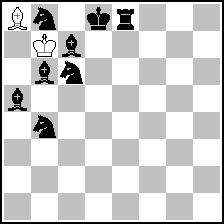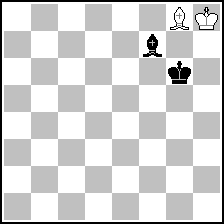|
| Page: [Previous] [Next] 1 2 |
| (1) Posted by Sarah Hornecker [Thursday, Aug 14, 2014 17:55]; edited by Sarah Hornecker [14-08-14] |
An almost joke question
SH, original, but probably anticipated
A given legal pawnless position with Black to move is drawn. If all pieces swap color and White is to move, the position is...
a) won for White
b) illegal
Where is the white king after the color swap?
Mark the text to see the solution:
a) on e1 (castling)
b) in check (for example bBa8 wKb7)
|
|
| (2) Posted by Kevin Begley [Thursday, Aug 14, 2014 19:18] |
I consider your solution to be incomplete -- the full position is required (at least one, with the possible admission that many positions may satisfy your stipulation).
|
|
| (3) Posted by Geir Sune Tallaksen Østmoe [Thursday, Aug 14, 2014 22:10] |
And your solution to b) is not the only solution. Consider the following position:
 (= 2+8 ) (= 2+8 )
|
|
| (4) Posted by Sarah Hornecker [Friday, Aug 15, 2014 02:39] |
Nice catch here!
|
|
| (5) Posted by Arno Tungler [Friday, Aug 15, 2014 04:31]; edited by Arno Tungler [14-08-15] |
The most economic that I see for b) without check is the beneath:
 (= 2+3 ) (= 2+3 )
And for a) even four units are enough...
 (= 2+2 ) (= 2+2 )
So, maybe a better setting of that idea (with the above unique [??] solutions) could be:
a) To a knight on f8 add a minimum of white and black units (no pawns) for a position with no king in check and Black to move that is drawn. If all pieces swap color and White is to move, the position is won for White.
b) To a knight on f8 add a minimum of white and black units (no pawns) for a position with no king in check and Black to move that is drawn. If all pieces swap color and White is to move, the position is illegal.
What are the positions?
EDIT: No, now I see that the bK can also be on g6 in b)...
|
|
| (6) Posted by Arno Tungler [Friday, Aug 15, 2014 05:15] |
And for b) with Siegfried's question and without check also 4 units are enough...
 (= 2+2 ) (= 2+2 )
This seems even be a unique position (besides mirrored) with 4 units.
|
|
| (7) Posted by Arno Tungler [Friday, Aug 15, 2014 05:46]; edited by Arno Tungler [14-08-15] |
Another try for unique solutions...
a) To a unit on h7 add a minimum of white and black units (no pawns) for a position with no king in check and Black to move that is drawn. If all pieces swap color and White is to move, the position is won for White.
b) To a unit on h8 add a minimum of white and black units (no pawns) for a position with no king in check and Black to move that is drawn. If all pieces swap color and White is to move, the position is illegal.
What are the positions?
Will let you try before I post my position for a)!
|
|
| (8) Posted by Geir Sune Tallaksen Østmoe [Friday, Aug 15, 2014 11:09]; edited by Geir Sune Tallaksen Østmoe [14-08-15] |
Good find with the 4-piece position for b)! Unfortunately, it is not entirely unique - it is still drawn if Black has a rook instead of a bishop on f7.
Is a) possible with 4 pieces? I have found various 5-piece positions, e.g. like this:
 (= 2+3 ) (= 2+3 )
|
|
| (9) Posted by Hauke Reddmann [Friday, Aug 15, 2014 15:04] |
 (= 2+2 ) (= 2+2 )
Or R, Se6, so much for unique ;-)
How about: "to a knight d6, add..."
Then you have Ka8 Bb8 - Kb6 Nd6 and Ke1 Ra1 - Kg1 Nd6. Unless
I misunderstood something, which is probable :-), this IS unique.
(Kh1 loses!)
Hauke
|
|
| (10) Posted by seetharaman kalyan [Friday, Aug 15, 2014 19:26]; edited by seetharaman kalyan [14-08-15] |
If king can be in check.... sorry it is the first post itself !
|
|
| (11) Posted by Geir Sune Tallaksen Østmoe [Friday, Aug 15, 2014 19:50] |
Looks like you are right, Hauke. Nice find!
|
|
| (12) Posted by Arno Tungler [Saturday, Aug 16, 2014 05:07] |
@Hauke, you had it ALMOST right - it's just switching White and Black for a) and it is perfect with two 4-units!
So, here is the entrance for FIDE-Album 2013-15 (oh no! - some of my co-authors do not like that, although it would be so nice for the study section...):
SH, HR, GSTO & AT
To a knight on d6 add a minimum of white and black units (no pawns) for a position with no king in check and Black to move that is drawn.
a) If all pieces swap color and White is to move, the position is won for White.
b) If all pieces swap color and White is to move, the position is illegal.
What are the positions?
Solutions:
a) wKg1 wSd6 - bKe1 bRa1; with swapped colors 1.0-0-0+ wins.
b) wKa8 wBb8 - bKb6 bSd6; with swapped colors illegal as there is no last move for Black.
The joke is gone but the solutions seem uniquie!
If there was already something like that, most likely Werner Keym did it...
See on http://www.thbrand.de/2013/02/22/werner-keym/ a position similar to our b)-solution with a different question. It shows that instead of swapping colors you could also just rotate the board!
|
|
| (13) Posted by seetharaman kalyan [Saturday, Aug 16, 2014 08:03] |
Actually in this case, the effect is the same.
|
|
| (14) Posted by Sarah Hornecker [Saturday, Aug 16, 2014 09:14] |
I have no issue with the album anymore, Arno. Send it in! :-)
|
|
| (15) Posted by Hauke Reddmann [Saturday, Aug 16, 2014 14:22] |
@Arno: Yes - flipping the board is easier, because of the CPT theorem
(H. Reddmann, Schwalbe article, issue...eh, must be ages).
For those who don't know that article, I quickly recap it here because
it is very fundamental. In physics, any situation is equivalent under
CPT operation (C=replace all matter by antimatter,P=mirror space,
T=reverse time). Intuitively, because nothing else than time, space
and matter exists. Be this as is (CPT proof DOES have some very weak
conditions, and instant Nobel to those who would find a CPT violation),
in Chess this is certainly true. C=swap color, P=flip board horizontally,
T=change right to move. It's obvious that "white" and "black" are
only labels (e.g. the "Immortal" was played with Andersen playing
black and beginning - or so I heard). Unless you have a fairy condition which
treats white and black unfairly (e.g. the common "black maximummer"),
CPT holds.
And yes, I did observe that you must either switch the knights color
between a and b or the order of the stipulations (which I'd prefer).
Hauke
|
|
| (16) Posted by Hauke Reddmann [Saturday, Aug 16, 2014 14:44] |
EDIT: So here would be the (simpler) CPT-switched version:
To a knight on d3 add a minimum of white and black units (no pawns) for a position with no king in check and White to move that is drawn.
a) If the board is flipped horizontally, the position is won for White. wKe8 wRa8 - bKg8 bSd3
b) If the board is flipped horizontally, the position is illegal. wKb3 wSd3 - bKa1 bBb1
(Or "rotated by 180°" instead of "flipped", and knight e3)
Hauke
|
|
| (17) Posted by Hauke Reddmann [Tuesday, Aug 19, 2014 13:13]; edited by Hauke Reddmann [14-08-19] |
Addendum:
 (= 4+3 ) (= 4+3 )
It's an easy Nalimov check to verify that this position flips between
won and lost on board mirroring. Can you improve on that (or at least
find a version with Nd6? :-)
Hauke
|
|
| (18) Posted by Georgy Evseev [Tuesday, Aug 19, 2014 15:11] |
At least it is possible to have 1 piece less.
(-white knights; +wpc7; bkd8->d5)
|
|
| (19) Posted by Geir Sune Tallaksen Østmoe [Tuesday, Aug 19, 2014 19:53]; edited by Geir Sune Tallaksen Østmoe [14-08-19] |
Georgy, the task is to do it without pawns.
I managed with six pieces:
 (= 3+3 ) (= 3+3 )
I didn't manage with Nd6, but at least there is a piece on d6 :)
|
|
| (20) Posted by Hauke Reddmann [Wednesday, Aug 20, 2014 12:30] |
So did "Karan" from schachfeld.de (since the problem is already published
on a public board, I took the liberty to let them have fun with it too),
and he found two different settings with 6 pieces too. One (or so I
think) can be included and it's unique with a Nd6 again (or so I think)!
Karan, schachfeld.de, Version HR
Add to a Nd6 blablaetc.; after a 90° rotation (!)
the position switches from Black wins to White wins.
Everyone, please check! Author solution here:
http://www.schachfeld.de/threads/26536-kleine-konstruktionsaufgabe
Hauke
|
|
Read more... |
Page: [Previous] [Next] 1 2
MatPlus.Net  Forum Forum  Promenade Promenade  An almost joke question An almost joke question |
 ISC 2025
ISC 2025 Forum
Forum  Promenade
Promenade  An almost joke question
An almost joke question 


